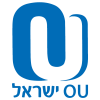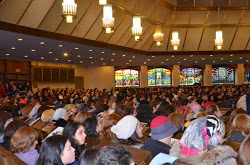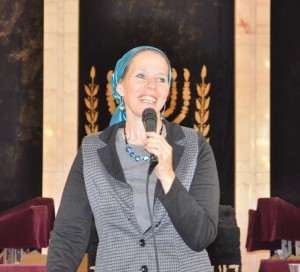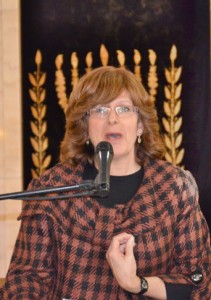By Rivka Segal, Director OU Israel Center Programs
People respond to tragedy in different ways.
It’s just a month since the tragic terror attack in Har Nof at Kehillat Bnai Torah. We lost four tzaddikim and many others were wounded. Everyone feels a tremendous sense of loss and pain.
And now, on the first day of Chanukah, all of Klal Yisrael marked the shloshim for the victims.
An estimated 2,000 women gathered in the Jerusalem Great Synagogue for the event that was organized by OU Israel.
We didn’t come in anger. We are not demoralized. We responded to this awful tragedy by strengthening ourselves. Our response is to try to become better people. In the midst of our sadness, we want to make the world better. One day at a time.
I am proud to be part of this large group of women.
Under the banner “Women to Women: United to Change the World,” we celebrate Chanukah: our personal rededication to Torah, Mitzvot, Am Yisrael and Eretz Yisrael.
The video of this amazing event is now available. It is already being shown in more than 50 communities around the world.
If you would like to organize the presentation of the “Women to Women” video in your community, contact rsegal@ouisrael.org
It is my prayer that we will soon come together to celebrate the חנוכת הבית [rededication] of the Third Beit HaMikdash.
Mrs. Rachel Frankel, mother of Naftali Frankel הי”ד who was kidnapped and murdered six months ago, acknowledged that while eulogies are not given during Chanukah, it is appropriate to learn Torah.
Referring to her son, she asked, “In terms of eternity, what’s the difference between 16 and 60 years?” Chanukah celebrates the miracle of one day’s worth of oil lasting for eight days. “Life is an endless series of miracles,” she continued. “The idea of celebrating a holiday is to make us aware of miracles. The day after Chanukah helps us recognize the miracles in our daily lives.”
“Six months ago, horrible things were happening. But in the midst of the darkness there was also glory and wonder. Am Yisrael poured out their good will. Everyone felt the need to be together.
“This is the reality of our lives. Let’s use the light [from Chanukah] every day. We can light our days by recognizing the good in each other and the hesed [kindness] that Hashem does. Every minute counts,” she said.
Mrs. Yakoba Kupinsky, wife of Rabbi Aryeh Kupinsky הי”ד , told the women about getting ready for Chanukah without her husband.
“As a teenager I imagined my ideal life. My husband and children. I never imagined being a single mother. But we all have individual things in our lives that aren’t ideal,” she said.
“Being murdered in shul isn’t ideal,” she continued. “The Torah that Moshe Rabeinu received is ideal.” On the other hand, “Rabbi Akiva’s Torah struggles with understanding the crowns on the individual letters. Our glory and our crowns. These are what get us through the hard times. They bring our glory and show what we can do even when life isn’t ideal.”
“There is a voice in my head that says ‘I didn’t get to say goodbye to you.’ This is not ideal. It’s frightening and overwhelming. Every day I ask Hashem for strength. All of us have our own personal galus [exile] that brings us our crown,” she said.
“The Chanukah miracle is based on a little flask of oil. That’s all the Jews had to work with. Now we’re making our own Chanukah miracle: Geula [redemption] is coming and we each have our own part in bringing it a bit closer.”
Mrs. Chaya Levine, wife of Rabbi Kalman Levine הי”ד , is director of the women’s division of Ner l’Elef, an international kiruv training organization.
Our enemies “keep trying to make the world a dark place,” she said. “But we have the light.”
During the time of the Hashmonaim, when the original Chanukah miracle took place, the message that the Greeks were spreading was “enlightenment.” “Many Jews at the time changed their identities.”
“Who stood up against the Greeks,” she asked. “Women and the Cohanim. Women have to know who they want to be. It’s our essence. Women have internal wisdom and emotional intelligence. When we feel pain, we cry out,” she said. But “this isn’t weakness. It’s our strength.
“It took strength [עוז] and heroism [גבורה] to stand up against the Greeks,” she said. “Today we know there are terrorists everywhere. Whenever there was a terror attack, my husband would gather us together. ‘This is a wakeup call to change,’ he would say. When something earth shattering happens, we have to determine what’s really important in our lives. We have to respond in a big way.”
“The Hashmonaim were successful [in fighting the Greeks] because they took action to get rid of the darkness. Now is the opportunity for us,” she said.
“We aren’t victims of circumstance or terror. We’re ready to face whatever challenges or battles Hashem wants. I want to be that pure olive oil that lights up the world. Each of us is a candle and Klal Yisrael needs every one of us.”
She concluded by challenging the audience to “aim high.” “Focus on the thing you can change,” she said. “We really have to change the world. One light at a time.”



